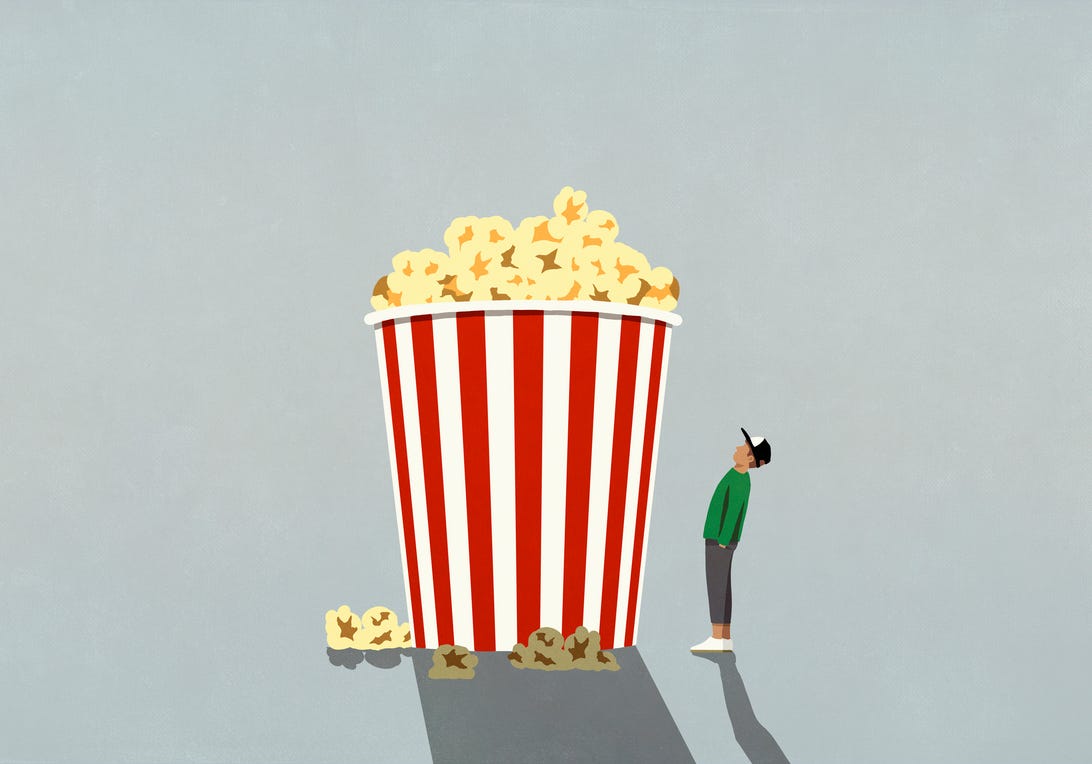[ad_1]

Malte Mueller/Getty Visuals
When you’re enduring stress, it truly is not only your mental well being that bears the brunt of it. Anxiety also requires a toll on your bodily health and fitness, spawning complications, weak snooze, muscle mass aches and additional. Which is since strain has an effect on every single process in your human body, from your nervous system to your heart to your abdomen.
And that, in turn, is why in the midst of working with a annoying situation, some people uncover on their own stocking up on every single single snack Trader Joe’s has at any time offered, or inhaling an entire bag of cheese curls. Meanwhile, other individuals have to power on their own to try to eat anything at all, getting neglected what an urge for food even feels like.
Food items is a fraught matter in our society, and it is straightforward to sense guilt when you consume far more or fewer than you prepared, or when you’ve got missing contact with whether or not you might be even hungry or not. But there is certainly no explanation to defeat your self up about strain feeding on (or forgetting to consume). Modifications in appetite are all section of your body’s natural reaction to tension, which is an unavoidable section of day-to-day lifetime. On the flip facet, if you might be pressured out all the time and anxious about your having practices, there are approaches to change it up and get assist.
This is how stress affects your appetite, which include why you might binge much more than usual or stop having completely. Moreover, how to tell when alterations in appetite are cause for concern, and what to do if you are concerned.
How stress affects your urge for food

Malte Mueller/Getty Illustrations or photos
Strain affects the appetite in various techniques, says Anna Rios, a foodstuff blogger and registered dietitian nutritionist working towards at Alliance Healthcare Heart. Whether or not it makes you take in a lot more or fewer relies upon partly on the style of stress.
“Unexpected or important strain can lessen appetite or shut it down entirely,” Rios describes. “This happens when the hypothalamus releases a corticotropin-releasing hormone that suppresses urge for food. Yet another hormone that plays a role in suppressing hunger is epinephrine. Epinephrine is unveiled when our bodies go into battle-or-flight method.” (Epinephrine is also known as adrenaline.)
Very long-time period tension is unique, having said that. “If the tension is persistent, the adrenal glands launch a hormone identified as cortisol,” Rios suggests. “Cortisol raises hunger, which generally sales opportunities to what we know as ‘stress feeding on.'” In addition to raising hunger, cortisol influences the style of foodstuff you want to try to eat. You are likely to crave foods that are substantial in body fat, salt and sugar, which are literal consolation meals — they “seem to have a opinions result that dampens worry relevant responses and feelings,” according to a Harvard Wellness blog.
Other appetite-linked hormones, like ghrelin, insulin and leptin, are also impacted by anxiety. Ghrelin, for instance, is recognised as the “hunger hormone” and is introduced in reaction to the two acute and serious pressure. A single analyze discovered that tension can affect ghrelin a lot more in the night than the daytime, which may well account for the urge to late-night binge. Additional study is necessary into how specifically these interactions perform, nonetheless.
Stress also affects your ingesting patterns in other, less direct techniques. If you are stressed, you’re probably not receiving great slumber, and “significantly less rest has been linked to enhanced cravings for processed foodstuff for the duration of the working day as perfectly as an irregular urge for food,” Rios suggests.
In some situations, tension having could also be linked more to emotions than to urge for food. “Some folks go to foodstuff when in pressure to distract and convenience,” claims Kathryn Fink Martinez, MS, a registered dietitian nutritionist and ingesting disorder specialist.
So even if you might be just dealing with a shorter-expression tense predicament, you may possibly however locate by yourself purchasing a pizza to make you truly feel greater. And even if you happen to be dealing with chronic strain, you may well take in much less than usual if you really feel also sad, fast paced or unmotivated to try to eat.
Is strain consuming harmful?

simplehappyart/Getty Photographs
Stress taking in is a properly usual section of lifestyle. You’re not going to take in the precise similar amount of meals just about every day, and that’s fine. Intuitively, it makes perception that you would have to have some additional gasoline when you’re pressured — all that tension can take a toll on your overall body and thoughts, and works by using up a ton of power.
“Most people strain eats or eats much less due to the fact of strain from time to time,” Rios says. Gaby Vaca-Flores, MA, yet another registered dietitian nutritionist, agrees. “Brief-phrase anxiety, these as from a bad day at function, may well prompt you to arrive at for far more convenience foodstuff than common at meal time,” she suggests. “This is a usual reaction to small-time period worry.” And in accordance to Martinez, even pressure taking in various days in a row is absolutely nothing to be concerned about.
Stress can complicate your partnership with foodstuff, though, and feeding on more or considerably less because of to pressure can also issue to a bigger mental health issue if it is really an ongoing detail. Below are some signs to seem out for, in accordance to the gurus.
- Major pounds obtain or loss
- Sensation out of management or unable to halt having
- Obsessing about foods
- Struggling to love food items
- Emotion much too weary to attain day by day activities
- Experience as nevertheless meals is your only coping system
If you experience any of these indications or are usually nervous, arrive at out to a therapist or dietitian with knowledge in psychological having for aid. They can enable you figure out other means to handle your stress, whilst also therapeutic your romantic relationship with food and getting you again in command of your each day daily life.
The information contained in this article is for educational and informational purposes only and is not intended as health or medical advice. Always consult a physician or other qualified health provider regarding any questions you may have about a medical condition or health objectives.
[ad_2]
Source link




